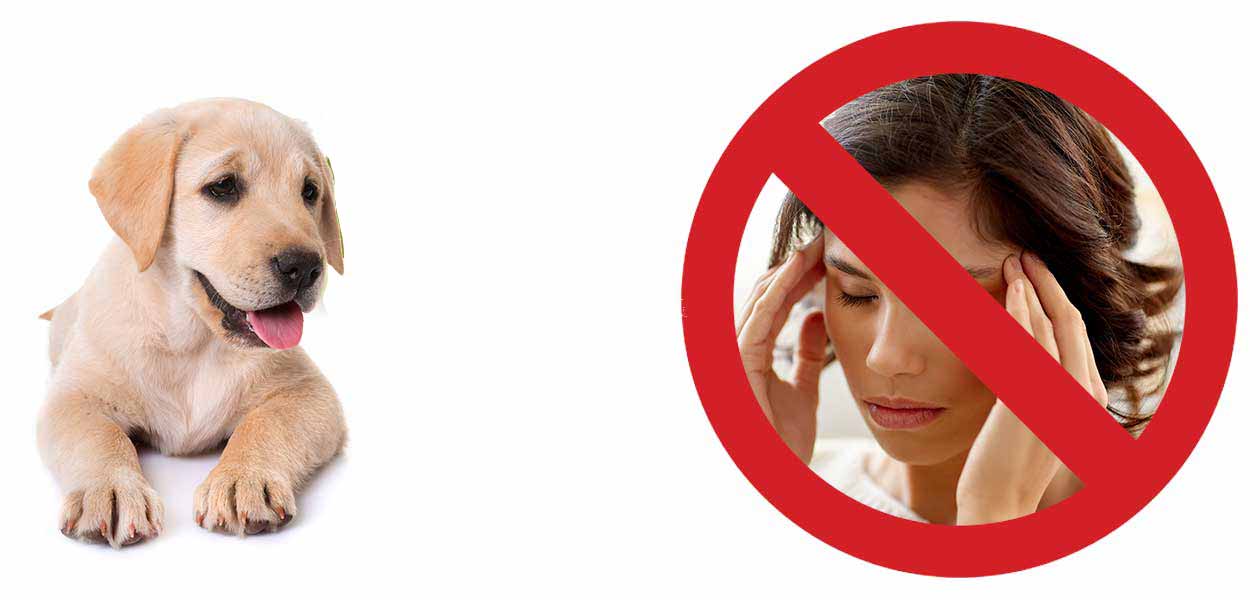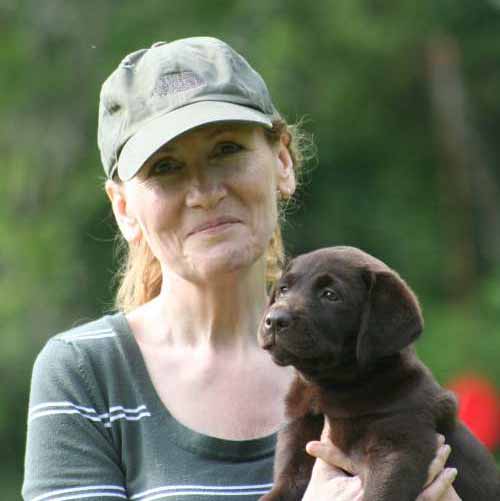 Working out what to do when your puppy pees in the house is an important part of potty training them.
Working out what to do when your puppy pees in the house is an important part of potty training them.
And in fact, it’s a lot simpler than you might think.
Puppies thrive under routine and supervision, and that’s the best way to help prevent accidents and move quickly into having a clear home.
But it might not be what you instinctively want to do when you find they have left a puddle on your nice clean floor.
What NOT To Do When Puppy Pees In The House
It’s natural to feel angry or upset when your puppy pees indoors.
After all, it’s frustrating to clear it up, not to mention unpleasant.
And makes you feel afraid that it is likely to happen again, or that potty training is regressing or not moving forward.
Many of the ways that people respond to finding their puppy has peed in the house are understandable, but not a good idea when you take a step back from the emotion..
These include:
- Shouting
- Growling
- Scolding them
- Punishing them
- Rubbing their nose in it
Staying Calm
Punishing a puppy for peeing in the house is a terrible idea.
Primarily, your puppy is unlikely to know what they are being punished for unless you catch them literally mid pee.
If you don’t catch them in the act, all they know is that you are angry and someone to be afraid of.
Possibly damaging their trust in you and your bond.
If you do catch them in the act, you won’t make them scared to pee in the house. They won’t make a connection between the location and the act.
You will just make them scared to pee in front of you.
This means next time they need to pee they will hide beforehand.
Making it even more likely that they will have another accident indoors.
Likewise, puppies have no idea what you mean when you rub their noses in their pee.
This act just makes the puppy think you are angry, and scares them.
It doesn’t help them to draw an association between an already long forgotten pee, and the place that they did it in.
So if none of these traditional ways of stopping your puppy peeing indoors work, what can you do when your puppy pees in the house?
Stay calm!
What To Do When Puppy Pees In House
The best thing to do when your puppy pees in the house, is initially, nothing.
Nadda. Zilch.
That’s right, you heard me.
As crazy as it sounds, the right thing to do when your puppy pees indoors is to shrug your shoulders, bite the inside of your lip, and think “oh well, never mind”.
Your next step is to look at how and why the accident happened.
Why Puppies Pee Indoors
The main reasons that puppies pee in the house include:
- Lack of supervision
- Not enough pee breaks
- Just had a drink or meal
It really is that simple.
In an older dog that was toilet trained you will have a few other options too, like UTI’s, but in puppies it is almost always one of those three things.
The best way to deal with accidents is to prevent them being repeated in future through more supervision, and additional pee breaks.
Where you can’t supervise the puppy but need to stretch the gap between pees, a crate is an excellent tool.
Puppies’ crates are their cosy dens, a safe bed where they want to settle down and have a strong instinct not to mess in.
Used lightly and carefully during the day they can draw out the gaps between toilet trips a little.
But don’t push too far, or you can end up forcing them to pee in their crate and create an even more problematic habit.
Puppy Potty Training Schedule
Whenever your puppy is out in the room with you, you need to be keeping an eye on her.
If she squats down, sniffs in a small area or has a big drink, it’s time to take her out to her pee place in the backyard.
But you can work to a general routine depending on your puppy’s age.
8 – 10 weeks old:
- 6am
- 8am
- 10am
- 12noon
- 2pm
- 4pm
- 6pm
- 8pm
- 10pm
- 2am
At 8 to 10 weeks old puppies need to pee at least every two hours.
With additional pee breaks after each meal and any big drinks, or excitements like visitors arriving.
As they age you can increase these gaps incrementally, and drop the dreaded night time pee after a week or two in most cases.
What To Do When Puppy Pees In House
When your puppy pees in the house, it is almost always as a result of a lack of routine, too great gaps between pees in their routine, or because you weren’t watching them when they are loose in the house.
Tiny puppies need constant attention, especially in the first few weeks that they are home with you.
But if you put in the legwork at this point, then potty training will be so much easier.
And the transition to dog ownership all the smoother for it.
If you catch your puppy peeing, please don’t punish her or rub her nose in it.
These actions won’t help speed up the process of toilet training, and will only result in upsetting you both.
Instead just take a look at what you are expecting of her in terms of the delay between toilet breaks, and try to readjust your schedule for a while to let her get back into the swing of things.
This article on how to train a puppy to pee might also help you out.

Free Training Tips
Get Pippa's free dog training tips delivered to your inbox

 How Do You Potty Train A 4 Month Old Puppy
How Do You Potty Train A 4 Month Old Puppy
Can you really train a dog with no negative reinforcement at all?
Positive reinforcement is an amazing tool, and we have taught many things to our new puppy this way. But, is there time and place for negative reinforcement?
I have memories of potty training our dogs when I was a child and teenager. We used to scold them for pooping inside. We didn’t hit them or smear their nose in their feces, but we made it clear that we did not like the behavior, by raising our voices and giving them a strong disapproving look on our faces, that they seemed to understand.
None of them developed any trauma or held a grudge against us. I have very fond memories of them as adults. We became best friends. They just quickly learned that they were not supposed to poop inside.
But now, we are supposed to train them with no negative reinforcement at all; only positive. Which, for me, it seems like getting rid of all your screwdrivers and trying to solve everything with a hammer. Different tools work for different problems.
The new method seems very bizarre to me: keep your dog in a box, like a toy, and only take it out when you are playing with it; otherwise, back to the box. They never get to experience the rest of the house by themselves.
This is not how I see dogs behave naturally. For example, whenever another dog came to visit, you would see them playing together, until eventually, the visitor would find our dog’s favorite toy, or favorite spot, or food bowl, at which moment our dog would growl or bark. After two or three times, the other dog would get the message, and they would continue playing together like nothing happened.
But I’ve never seen a dog lock another dog in a box.
My question is:
How do we know that the new method works better? If the answer is “Well, that’s what the experts say”, then the next question is “How did the experts arrive at that conclusion?”
Are there scientific studies on this?
WE AVE A I YEAR 2 MONTH OLD MALE AUSSIE.
EVERYTIME I THINK HE IS TOTALLY TRAINED, WE GO BACK.
WE HAVE TRIED EVERYTHING.
HE STARTED TO DO A NUMBER 2IN THE KITCHEN AGAIN, AND PEE.
THEN GOES IN THE UPSTAIRS BATHROOM AGAIN.
AND HE GOES IN THE YARD LIKE HE SHOULD.
SHOULD WE PUT FOOD DOWN, AND IF HE EATS HE DOES.
AND REMOVE THE FOOD???
HELP
Are you talking him out every two hours as you should be. Also f you are telling at him when he pee/poops in the house you are making letters worse! You should learn the proper way to train him and not make him afraid of you if indeed you are doing the above. The older the dog is when you start trading them sometime s the longer it takes. If you truly love your dog you will find a loving way to properly train him.
Thanks Pippa.
I’ve read your books, watched many tutorials online but I’m still flummoxed by my puppy (Jack) and his bladder. Some details:
– Labrador male 11 weeks old (home since 9 weeks)
– He is very bright and has learnt basic training (manners) very quickly.
– Holds his bladder all night (6-7 hours)
– We live in an apartment in northern Italy – doors to balcony left open.
– Front balcony (by living room doors) has always been set as potty area with lots of disposable pee mats and a plastic potty area with artificial grass.
– During the day he will hold his bladder even for 4 hours if sleeping.
– Has a crate – and has only had two accidents there, one of which was my fault for being too slow to get out of bed 😉
– He does not routinely pee after meals, drinks, sleeping or playing.
– Because he is holding it in, he will pee immediately on getting outside to the street.
– I spend hours sitting on balcony with him – nothing, crate him for 15/20 mins, balcony… nothing.
– I try to take him outside to street every hour now which seems to work.
– But whenever inside the flat he will pee, if unwatched very frequently.
– Since 5 days he has not done a poo in the flat – always on the mat on balcony or street.
– I pretty much always catch him mid-flow and say ‘no’, scoop him up and place him on the mat on the balcony where he immediately seizes up and will then go and lie down and sleep.
Our routine so far:
– wake at 6am – out to street for pee
– play for an hour with a little light training to reinforce basics such as ‘wait’ and ‘come’
– Breakfast at 7am – out to street again.
– Play and then crate while I shower
– He will then sleep a couple hours – I work
– Street for pee
And so on throughout day…
– 13:00 lunch and same structure as morning
– 19:00 dinner and same structure
– 21:30+ lastly quick street pee
– 22:15 bed for both of us
– From his crate he can see down corridor to my bedroom and leave doors open – but generally he sleeps very well and only wakes once a night.. wanting a little water (never pee’s on balcony)
Info about me and my situation:
– I live alone (kids 16 and 14 visit about once a week but since visit Jack have not stayed as we try to establish a routine.
– I work from home (remote working) not many calls, flexible in my hours and work.
– I’ve had mistakes of pee with him when I’m not watching every second – now crate when I need to prepare own meals (even 2 seconds looking at stove and he will pee in kitchen by my feet).
– I’m now more confused than ever. And find myself getting angry.
– The frustration is accentuated because I have no opportunities for positive reinforcement now and know my mood is detected by him and this may be contributing to the problems.
Desperate for advice please. Apologies for the long mail but wanted to put down the details in hope it provides sufficient background for advice.
Thank you and kind regards,
Mike
Hi Mike, we have a few other guides on potty training that may be able to offer a little more help, such as:
“How Do You Potty Train a Four Month Old Puppy”
“The Essential Dos and Donts of Puppy Potty Training”
and “Potty Training a Puppy in an Apartment“.
Alternatively, you may also want to take a look at Pippa’s online dog training courses. Puppy parenting in particular takes a closer look at solving potty training problems! Best wishes.